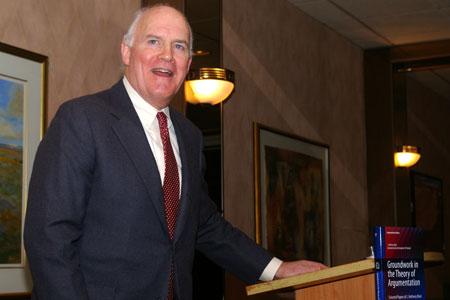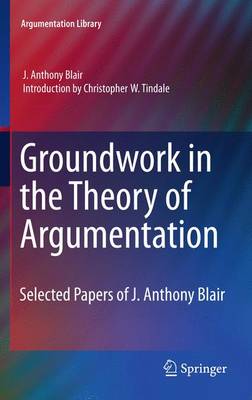Professor Walton’s Work Impacts the Semantic Web
A new paper by researchers from institutes in Ireland and Australia has acknowledged the influential work on computer argumentation of Distinguished Research Fellow Douglas Walton. In their article in Semantic Web Journal titled “A Review of Argumentation for the Social Semantic Web,” Professors Jodi Schneider, Tudor Groza and Alexandre Passant give prominent attention to what they call “the Walton model.” The paper is further welcome recognition of the impact on society and science that the work of CRRAR fellows continues to have.
Making the World a Better Place

Philosophy professor emeritus Tony Blair smiles at friends and colleagues during a reception to mark the publication of a collection of his best works.
For the last 45 years, Tony Blair has been making the world a better place, one argument at a time.
A professor emeritus in the university’s Philosophy department, Blair is one of the original founders of a school of thought known as informal logic. Simply put, it’s a manner of ordinary reasoning that helps people become more skilled critical thinkers, better able to assess the validity of arguments they’re faced with every day.
“It’s a method for identifying and qualifying the kinds of arguments we find in everyday discourse, whether it’s in newspapers or magazines, in political debates,” said Blair, who was honoured at a Katzman lounge reception Wednesday to mark the publication of Groundwork in the Theory of Argumentation, a collection of some of his best essays from the last 30 years.

Walton Festschrift
Dialectics, Dialogue and Argumentation: An Examination of Douglas Walton's Theories of Reasoning and Argument. Edited by Chris Reed and Christopher W. Tindale. London: College Publications
The festschrift honours Douglas Walton, a leading philosopher of argumentation. His theories of argument structure, whilst rooted in Aristotelian philosophy, have been influential in computer science and artificial intelligence. His theories have a strong empirical side and cover much of how argument and debate is conducted. They examine how the process of exploring disagreement and reaching consensus can be structured, and how the 'nuts and bolts' of reasoning in communication are put together. His theories are increasingly finding application in computer science, where his approach to commitment based modelling of dialogue has influenced the design of protocols for software agents, and his work on argument structure is being used to guide the development of a new, world-wide argument web.
Contributors include: Trudy Govier, Jan Albert van Laar & Erik Krabbe, Fabrizio Macagno, Fabio Paglieri, Chris Reed, Eddo Rigotti & Rudi Palmieri, Trevor Bench-Capon & Katie Atkinson, Frans, van Eemeren, Peter Houtlosser, Constanza Ihnen & Marcin Lewinski, Jean Goodwin, Tom Gordon, David Hitchcock, Henry Prakken, J. Anthony Blair, David Godden, Ralph Johnson, Christopher Tindale, and John Woods.
No argument here: centre's founding a logical next step
Inaugural Reception, March 14, 2007
University of Windsor Daily News, March 16, 2007
The University of Windsor's international impact on the study of informal logic has been demonstrated many times, president Ross Paul said Wednesday, at a reception to celebrate the founding of the Centre for Research in Reasoning, Argumentation and Rhetoric.
Read the original Daily News article.
Publication of Prof. Tindale's new book
Argumentation researchers working to find broader audience
University of Windsor Daily News, March 13, 2007
Philosophy professor Christopher Tindale says he is constantly surprised at where his research crops up. A specialist in argumentation theory, he finds citations of his work in unexpected places.
